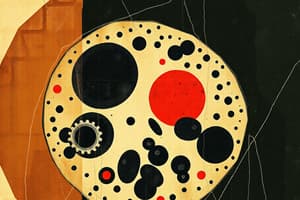Podcast
Questions and Answers
What is the primary function of the Golgi apparatus?
What is the primary function of the Golgi apparatus?
- Transportation of materials within the cell
- Cell division regulation
- Modification, sorting, and packaging of proteins and lipids (correct)
- Digestion of macromolecules
Which enzyme type is primarily found in lysosomes for breaking down macromolecules?
Which enzyme type is primarily found in lysosomes for breaking down macromolecules?
- Glycosyltransferases
- Catalase
- Hydrolases (correct)
- Phosphatidyltransferases
What role do peroxisomes play in cellular function?
What role do peroxisomes play in cellular function?
- Detoxification and lipid metabolism (correct)
- Storing ATP and proteins
- Protein synthesis
- Recycling damaged organelles
Which structure is primarily responsible for maintaining cell shape and enabling intracellular transport?
Which structure is primarily responsible for maintaining cell shape and enabling intracellular transport?
What is the main function of vesicles in the cell?
What is the main function of vesicles in the cell?
What is the consequence of peroxisomal disorders, such as Zellweger syndrome?
What is the consequence of peroxisomal disorders, such as Zellweger syndrome?
Which cellular structure is involved in chromosome segregation during cell division?
Which cellular structure is involved in chromosome segregation during cell division?
Which of the following is a common disorder related to lysosomal function?
Which of the following is a common disorder related to lysosomal function?
What is the primary function of the nucleus in an animal cell?
What is the primary function of the nucleus in an animal cell?
Which organelle is responsible for ribosome production?
Which organelle is responsible for ribosome production?
The nuclear envelope primarily regulates what process?
The nuclear envelope primarily regulates what process?
Which of the following describes the main role of mitochondria?
Which of the following describes the main role of mitochondria?
What is the main function of the rough endoplasmic reticulum?
What is the main function of the rough endoplasmic reticulum?
Which organelle is involved in lipid synthesis and detoxification?
Which organelle is involved in lipid synthesis and detoxification?
What does ribosomal dysfunction, such as in Treacher Collins syndrome, primarily affect?
What does ribosomal dysfunction, such as in Treacher Collins syndrome, primarily affect?
Which associated condition is linked to mitochondrial dysfunction?
Which associated condition is linked to mitochondrial dysfunction?
Study Notes
Animal Cell Structure
-
Nucleus: Houses genetic material (DNA) and controls growth and division; regulates gene expression and the cell cycle.
-
Nucleolus: Site of ribosome biogenesis; synthesizes rRNA and assembles ribosomal components necessary for protein synthesis.
-
Nuclear Envelope: Double membrane structure protecting the nucleus; regulates substance exchange between nucleus and cytoplasm via nuclear pores.
-
Mitochondria: Powerhouse of the cell; generates ATP through oxidative phosphorylation and regulates apoptosis, essential for cellular metabolism.
-
Rough Endoplasmic Reticulum (Rough ER): Studded with ribosomes, it is crucial for the synthesis of membrane-bound and secretory proteins.
-
Smooth Endoplasmic Reticulum (Smooth ER): Involved in lipid synthesis, detoxification of drugs, and calcium storage and regulation.
-
Ribosomes: Complexes of rRNA and proteins; perform protein synthesis by translating mRNA into proteins.
-
Golgi Apparatus: Modifies, sorts, and packages proteins and lipids for secretion or transport, playing a key role in cellular trafficking.
-
Lysosomes: Contains digestive enzymes (hydrolases) for intracellular digestion and recycling of macromolecules, waste, and pathogens.
-
Peroxisomes: Breaks down fatty acids and detoxifies reactive oxygen species (ROS), crucial for lipid metabolism and neutralization of harmful substances.
-
Cytoplasm: Aqueous solution supporting organelles; the site for metabolic reactions and maintaining cellular structure.
-
Cytoskeleton: Composed of actin filaments and microtubules; provides structural support, assists in cell movement, division, and organelle positioning.
-
Centrosome: Organizes microtubules; plays a significant role in cell division, ensuring correct chromosome segregation during mitosis and meiosis.
-
Vesicles: Small membrane-bound carriers that transport materials within the cell, aiding in endocytosis and exocytosis for molecule secretion.
Studying That Suits You
Use AI to generate personalized quizzes and flashcards to suit your learning preferences.
Description
This quiz focuses on the anatomy and physiology of animal cell structures. It covers the functions of organelles, their biochemical components, and their significance in cellular processes. Additionally, it touches on associated diseases, making it a comprehensive resource for understanding cell biology.




